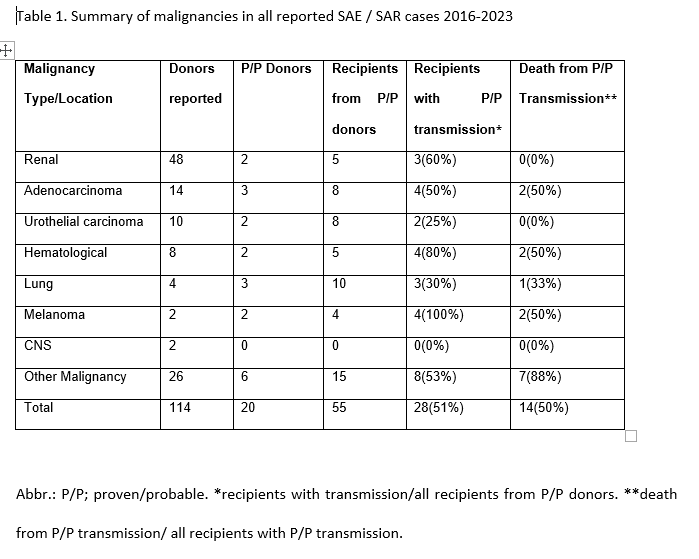Donor-transmitted cancer in organ donation and solid organ transplantation in Germany from 2016-2023
Klaus Böhler1, Axel Rahmel1, Jimmy van Konijnenburg2, Ana P Barreiros1.
1German Organ Transplant Foundation, Frankfurt, Germany; 2Eurotransplant, Leiden, Netherlands
Introduction: Analyzing reported serious adverse events (SAE) and serious adverse reactions (SAR) is an essential part of an effective vigilance and surveillance system in organ donation and transplantation. The German organ procurement organization (Deutsche Stiftung Organtransplantation – DSO) is assigned by the German Federal Ministry of Health to manage and monitor SAE and SAR. Donor-transmitted cancer (DTC) can pose an additional risk to the recipients with significant morbidity and mortality.
Method: All incoming SAE and SAR reported from January 1st, 2016 to December 31st, 2023 related to a potential malignant disease were analyzed. A DTC was defined as a malignancy occurring in the recipient that was in hindsight already present within the donor organ at the time of transplantation. The assessment of imputability as proven or probable (P/P) transmission was done according to the grading system of the US Disease Transmission Advisory Committee (DTAC).
Results: From January 1st, 2016 to December 31st, 2023, 9771 donors were realized resulting in 27919 organ recipients. 163 malignancy related reports were received. In 114 donors a malignant tumor was histopathologically confirmed (114/9771; 1,1%). In 20 of these 114 cases (17,5%) a P/P DTC from the donor to one or more recipients was detected, involving 28 recipients (tumor transmission rate on a donor level 20/9771 -> 0,20 %, on a recipient level 28/27919 -> 0,10 %). The 20 P/P DTC cases included three adenocarcinomas, two lymphomas, two melanomas, two renal cell carcinomas, two urothelial carcinomas, two neuroendocrine lung cancer, one non-small cell lung cancer, one pleural mesothelioma, one squamous cell carcinoma, one angiosarcoma, one choriocarcinoma, one Kaposi sarcoma and one carcinoma of unknown primary (CUP). 14 of the 28 recipients died due to the tumor transmission (14/28; 50 %).

Conclusion: Donor-transmitted cancer is a rare event, but when it occurs can lead to significant morbidity and mortality of the recipients. Reporting of SAE and SAR can identify possible risks in organ donation and solid organ transplantation and help to improve donor characterization and to increase awareness of transmission events.
[1] Organ donation
[2] donor-transmitted cancer
[3] serious adverse event
[4] serious adverse reaction
[5] cancer
